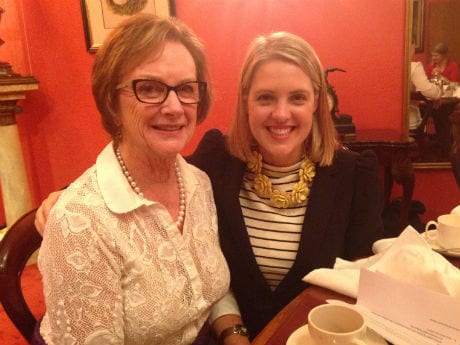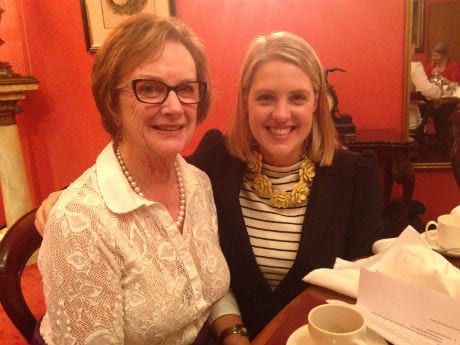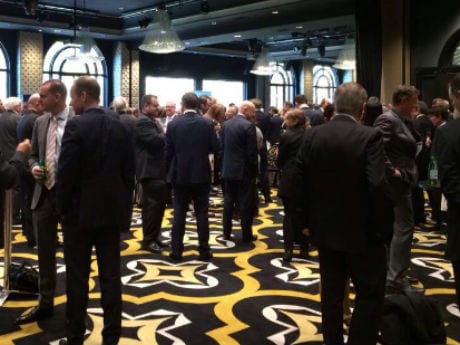It turns out that yesterday I found myself in the wrong place for lunch. I had been invited to attend a lunch that Wendy McCarthy was hosting to discuss early learning and childcare, an issue Australia is grappling with.
Wendy assembled a small group of people, each of whom had some familiarity – professional, personal or both – with the topic. Some at the table work in the field and, understandably, had a more sophisticated understanding of the finer details in the Productivity Commission’s recent report. Some have used childcare in the past, some – like myself – use it right now and some are hoping to have children in childcare very soon.
Whatever their starting point, all shared an understanding of the importance of quality childcare, the policy framework and the reality of accessing childcare in Australia.
I doubt anyone emerged from the discussion feeling they had the solution, but, equally, I doubt anyone left the room believing the solution was beyond us.
The women, yes they were all women, I shared a table with recognise that childcare isn’t just about women and work. They understand it is about providing the best educational opportunities for children, regardless of their family circumstances. They understand that investing in high quality early learning is an investment in our country’s future. In our society, in our workplaces, in our families, in our economy. They understand that an appropriate framework for early learning and childcare is the best opportunity a country has to boost its female workforce participation rates. None of this is a matter of opinion; it is a matter of fact.
There is a lot that is complicated about the provision of childcare, but one aspect of it that is entirely uncomplicated is why it matters. The evidence is clear and overwhelming. Investing in high quality education for children is smart – economically and socially – which is why most developing countries are investing heavily in it.
Australia is lagging other countries, not just in implementing a framework to reap these rewards, but in recognising those rewards. Rather than sensibly debating how and why universality and access and quality can be incorporated into childcare across Australia, we are still trying to explain why.
We are stuck in a place where childcare is still, frequently, derided as being state-funded babysitting. As being some kind of welfare rort for mums who don’t want to look after their kids.
Look at the comments thread on any news site beneath a story on childcare or paid parental leave and you will quickly see what I mean. We are so far from the eight ball it is laughable.
Which brings me to the point when I realised I was at the wrong lunch. We all were. You see across town in Sydney the prime minister Tony Abbott was addressing a room touching on similar issues.
Mercifully, he did say the government is interested in making sure the sums mean parents – especially mums – can return to work after a baby. (I say mercifully because if we were going to judge this government’s intentions by actions it’s hard to conclude that women’s workforce participation is not as important to this government as climate change or human rights. Which is to say dispensable, irrelevant and completely excess to needs. At least by mouthing these words, it’s possible he’s at least thinking about it.)
Less mercifully, the PM appeared to confirm what many have been dreading.
“And our small business tax cut will be more than paid for by not proceeding with the parental leave scheme that’s already been taken off the table.”
That $5.5 billion a year that was going to be directed into boosting women’s participation at work? Gone.
At the Australian Chamber of Commerce and Industry lunch Tony Abbott continued:
“That’s why our childcare initiative for families is contingent – it is contingent – on the delivery of savings to pay for it because we can’t have the spending without the saving to make it sustainable.
I should repeat, because it’s absolutely critical: there will be no new spending that’s not offset against savings. As well, there will be no big new spending that’s not directed to making our economy stronger.
Our childcare measures will boost participation – making our economy stronger.”
Except that within the framework the government is currently working, the increase to participation will be negligible. The Productivity Commission confirms as much.
“Our task is to help with the challenges of having a family, especially when children are very young, so that when parents feel like getting back into the workforce, they can say ‘Yes, this is worth it.’
Because parents hold the key to increasing workforce participation, a key component of the government’s family package will be to make child care more affordable to give families more choices.”
It is a noble objective but, as many of us debated over lunch, it’s a tough task without changing the funding envelope. Tinkering around the edges isn’t going to deliver Australia a markedly better early learning and childcare policy. Affordability is also just one aspect of childcare that needs to be tackled, if we are to reap the rewards from a decent policy.
Do you think those in the room listening to the PM yesterday know that? Does he? Do you think those in the room share an easy familiarity with the nuances of the issue? On seeing two images of the room, I’ll admit my expectations were low.
Look at the group. Notice anything? A woman’s face? I can make out three. And that is when I realised I was at the wrong lunch. We all were. At the risk of seeming immodest I’d posit that the combined knowledge of the 12 women I lunched with, would quite easily match the entire room the PM addressed. Our conversation needed to happen there.




